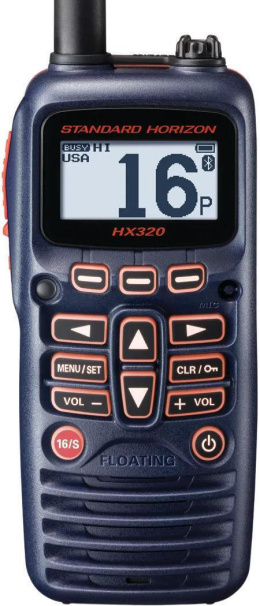-
Language

-
Currency : CZK
-
Customer zone
-
Shopping Cart ( 0 )
- New Arrivals
-
Brands
- Allen
- Antal
- AS
- Blacksmith
- CanSb
- Clamcleat
- Devoti
- D-splicer
- ePropulsion
- Fendress
- Forsheda
- G Composites
- Gottifredi Maffioli
- Gul
- Harken
- Helly Hansen
- Holt
- Jobe
- Lalizas
- Liros
- Majoni
- Marlow
- New England
- Oakley
- Open Skiff
- Optimum Time
- Optiparts
- PolarWave
- PSA
- PSP
- Raymarine
- Ripper
- Robline
- Ronstan
- Rookie
- Rooster
- SeaSure
- SeaLine
- Selva Marine
- Showa
- Spinlock
- Sportis
- Vector
- West System
- Wichard
- Winner
- WIP
- Zhik
- Uvex
- Yachticon
- Chandlery
-
Cloating
- Safety
-
Repair and Service
- Sale
- Kite/ Windsurfing
- SUP
- Market
- Outlet
-
- New Arrivals
-
Brands
- Allen
- Antal
- AS
- Blacksmith
- CanSb
- Clamcleat
- Devoti
- D-splicer
- ePropulsion
- Fendress
- Forsheda
- G Composites
- Gottifredi Maffioli
- Gul
- Harken
- Helly Hansen
- Holt
- Jobe
- Lalizas
- Liros
- Majoni
- Marlow
- New England
- Oakley
- Open Skiff
- Optimum Time
- Optiparts
- PolarWave
- PSA
- PSP
- Raymarine
- Ripper
- Robline
- Ronstan
- Rookie
- Rooster
- SeaSure
- SeaLine
- Selva Marine
- Showa
- Spinlock
- Sportis
- Vector
- West System
- Wichard
- Winner
- WIP
- Zhik
- Uvex
- Yachticon
- Chandlery
-
Cloating
- Safety
-
Repair and Service
- Sale
- Kite/ Windsurfing
- SUP
- Market
- Outlet

- New Arrivals
-
Brands
- Allen
- Antal
- AS
- Blacksmith
- CanSb
- Clamcleat
- Devoti
- D-splicer
- ePropulsion
- Fendress
- Forsheda
- G Composites
- Gottifredi Maffioli
- Gul
- Harken
- Helly Hansen
- Holt
- Jobe
- Lalizas
- Liros
- Majoni
- Marlow
- New England
- Oakley
- Open Skiff
- Optimum Time
- Optiparts
- PolarWave
- PSA
- PSP
- Raymarine
- Ripper
- Robline
- Ronstan
- Rookie
- Rooster
- SeaSure
- SeaLine
- Selva Marine
- Showa
- Spinlock
- Sportis
- Vector
- West System
- Wichard
- Winner
- WIP
- Zhik
- Uvex
- Yachticon
- Chandlery
-
Cloating
- Safety
-
Repair and Service
- Sale
- Kite/ Windsurfing
- SUP
- Market
- Outlet
-
- New Arrivals
-
Brands
- Allen
- Antal
- AS
- Blacksmith
- CanSb
- Clamcleat
- Devoti
- D-splicer
- ePropulsion
- Fendress
- Forsheda
- G Composites
- Gottifredi Maffioli
- Gul
- Harken
- Helly Hansen
- Holt
- Jobe
- Lalizas
- Liros
- Majoni
- Marlow
- New England
- Oakley
- Open Skiff
- Optimum Time
- Optiparts
- PolarWave
- PSA
- PSP
- Raymarine
- Ripper
- Robline
- Ronstan
- Rookie
- Rooster
- SeaSure
- SeaLine
- Selva Marine
- Showa
- Spinlock
- Sportis
- Vector
- West System
- Wichard
- Winner
- WIP
- Zhik
- Uvex
- Yachticon
- Chandlery
-
Cloating
- Safety
-
Repair and Service
- Sale
- Kite/ Windsurfing
- SUP
- Market
- Outlet
-
ICOM Handheld Radiotelephone M25EURO
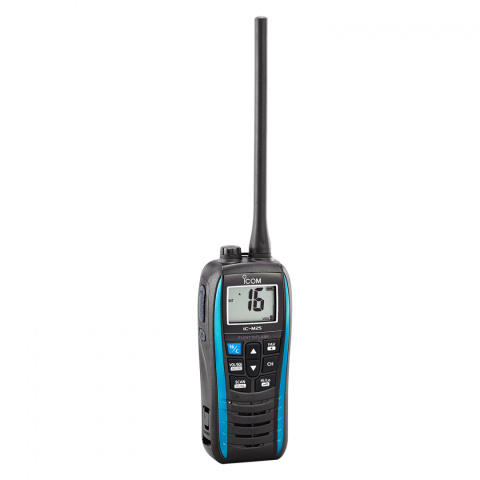

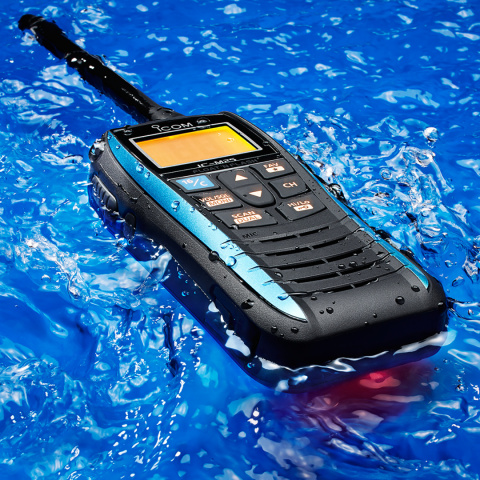

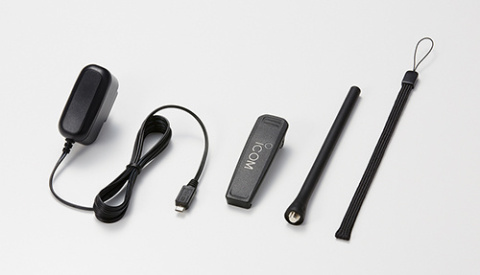

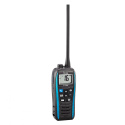
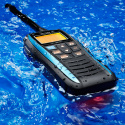

| Enter your email |
| Reviews |
lack of ratings
(Add )
|
||
| Shipping within | 24 hours | ||
| Shipping price |
0,00 Kč
|
| The bar code | |
| EAN |
- Description
- Safety Information
- Reviews & ratings (0)
Features:
- Slim, lightweight with high performance
The IC-M25EURO has the slimmest (depth:30.5 mm) and lightest (218 g) body as a floating marine transceiver*. It also delivers uncompromised performance that will exceed expectations.
- Large LCD and intuitive user interface USB charging (Micro-B USB type)
The IC-M25EURO’s LCD is 30% larger than its predecessor, the IC-M23 and shows clearly large channel number and status icons. The buttons on the front panel are well laid out and provide simple and straightforward operation.
- Float’n Flash function
The IC-M25EURO floats and lets you know where it is with the flashing red LED light and LCD/key backlight.
- 11 hours of long operating time
The built-in 1500 mAh lithium-ion battery allows 11 hours (approx.) of long operation*.
* Typical operation with Tx (Hi): Rx: standby=5:5:90
- 5 W RF output, 550 mW clear audio
The IC-M25EURO provides a powerful 550mW (typical) audio output and received voice can be heard loud and clear.
- IPX7 waterproof protection
Other Features
・ IPX7 waterproof construction
(1 m depth of water for 30 minutes)
・ 4-step battery life indicator
・ Dual/Tri-watch functions*
・ Instant access to Ch 16 or programmable call channel
・ Favorite channel function
・ Monitor function opens noise squelch
・ Auto scan function*
・ LCD auto backlighting
・ AquaQuake™ draining function
・ Supports 4-digit channels
Supplied accessories:
- Belt clip, MB-133
・ Antenna, FA-SC59V
・ Hand strap
・ Battery is built-in
General
| IC-M25EURO | IC-M25EURO AUS version |
||
|---|---|---|---|
| Frequency range | Tx | 156.000–161.450 MHz | 156.025–157.425 MHz |
| Rx | 156.000–163.425 MHz | 156.300–162.000 MHz | |
| Usable channel groups | INT, USA*, ATIS* channels * Depending on version |
INT, USA, WX channels | |
| Type of emission | 16K0G3E (FM) | ||
| Power supply voltage | 3.7 V DC nominal | ||
| Current drain | Tx | 2.3 A | |
| Rx (Internal SP/External SP) | 300 mA/200 mA (Max. audio) | ||
| Operating temperature range | –15°C to +55°C | –10°C to +55°C | |
| Antenna impedance | 50 Ω | ||
| Dimensions (W×H×D) (Projections not included) |
56.6×134.2×30.5 mm | ||
| Weight (approximately) | 220 g (With FA-SC59V and MB-133) |
||
Transmitter
| IC-M25EURO | IC-M25EURO AUS version |
||
|---|---|---|---|
| Output power | 5 W (approx.)/1 W/0.5 W* * For only FRG version |
5 W (approx.)/1 W | |
| Max. frequency deviation | ±5.0 kHz | ||
| Frequency stability | ±1.5 kHz | ±10 ppm | |
| Spurious emissions | 0.25 μW | 0.25 μW typ. | |
| Adjacent channel power | 70 dB | ||
| Residual modulation | 40 dB | ||
Receiver
| IC-M25EURO | IC-M25EURO AUS version |
||
|---|---|---|---|
| Sensitivity | –6 dBμ emf typ. (at 20 dB SINAD) | ||
| Squelch sensitivity | –6 dBμ emf typ. (at threshold) | ||
| Adjacent channel selectivity | 70 dB | 65 dB | |
| Spurious response | 70 dB | 65 dB | |
| Intermodulation | 68 dB | 65 dB | |
| Audio output power (at 10% distortion) |
Internal SP | 550 mW typ. (12 Ω load, at 1 kHz) | |
| External SP | 200 mW (4 Ω load) | ||
Measurements made in accordance with EN301-178 (IC-M25EURO) and AS/NZS 4415.2-2003 (IC-M25EURO AUS Version).
All stated specifications are subject to change without notice or obligation.
Safety Information
Safety Instructions for Radios
Safety Guidelines
Proper Use
Radios are intended for communication in difficult conditions, such as on water, during sailing, or on ships. They should be used solely for communication purposes, emergency situations, and daily contact with other units.
Ensure that the radio is always adequately charged or powered to ensure full functionality in emergency situations.
Never use the radio in a way that could interfere with other electronic devices or communication systems. Follow the applicable regulations regarding radio frequencies.
Safe Usage
Always keep the radio in a dry, safe place to prevent damage from water, dust, or shocks.
Use the device according to the user manual and ensure that you understand its functions, including how to transmit and receive messages.
If needed, use the SOS function or any other alarm feature if available on your radio model.
Regular Inspection Before Use
Technical Inspection
Before each use, check that the radio is functioning properly. Pay attention to:
Battery or power status – make sure the batteries are adequately charged or replaced to ensure proper device operation.
Antenna – ensure the antenna is functional and securely attached to ensure good signal quality.
Buttons and knobs – check that all control elements are functioning properly and that the display is readable.
Device housing – make sure the radio is free from cracks or other damages that could affect its performance or safety.
Testing Before Use
Regularly test the radio to ensure it can properly receive and transmit signals. Check range and transmission quality in different conditions.
Cleaning and Maintenance
Cleaning
After each use of the radio, especially in harsh conditions such as seawater or rain, wipe the device with a damp cloth to remove salt, dust, and contaminants.
Avoid using harsh chemicals that could damage the radio's housing.
Storage
Store the radio in a dry place, away from moisture and heat sources. Always ensure that it is stored in a location that provides easy access in emergencies.
If the device is equipped with a battery, remember to regularly charge or replace it to prevent it from draining or being damaged.
Emergency Situations
Communication in Crisis Situations
In an emergency, use the radio to call for help. Use the appropriate emergency frequencies (e.g., 156.8 MHz for VHF) and follow communication procedures. If necessary, use the SOS function or other alarms available on your device.
Transmit clear and concise information, such as your location, the nature of the problem, and the condition of the crew or passengers.
Device Failure
If the radio stops working during use, check the battery status, ensure the device is turned on, and check that the antenna is not damaged.
In case of serious malfunction, immediately remove the device from use and contact the manufacturer's service.
Contact in Case of Problems
If you notice manufacturing defects or damage to the radio, contact the manufacturer or point of sale to report the issue and get assistance. Do not modify the device yourself to avoid worsening its performance.
Manufacturer details
Icom Inc.
1-1-32, Kami-minami, Hirano-ku
547-0003 Osaka
Japan
+81 (06) 6793 5302
export@icom.co.jp
Responsible person
VORTEX SPÓŁKA Z OGRANICZONĄ ODPOWIEDZIALNOŚCIĄ
GRUNWALDZKA 28/6
80-229 Gdańsk
Poland
(58) 355 51 22
vortex@vortex.mil.pl
- Similar products
- Recently viewed products



